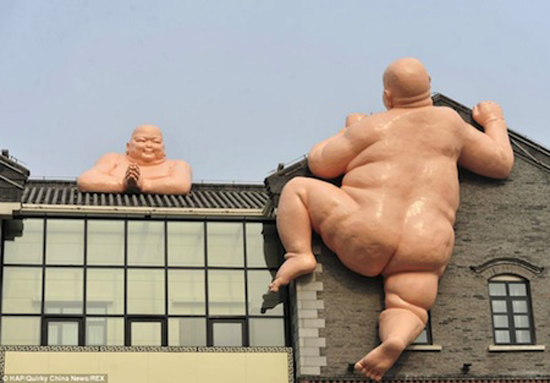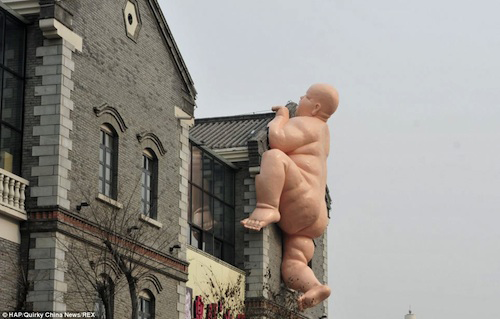
My body’s too Buddhalicious for ya, babe
These pictures from the pages of London’s notorious Daily Mail depict two naked statues, identified as the likenesses of the Buddha, atop a soup restaurant in the eastern Chinese city of Jinan, Shandong province. But is that really the usually svelte ancient Indian we know as the Buddha?
The restaurant’s owner, who installed the two pieces in what’s become a highly successful publicity stunt, has assured local news outlets that they depict nothing more than generic young children. Yet Chinese residents remained unconvinced. One Buddhist practitioner, from the Beihai Zen Monastery in Qinghai province, recounted how she “burst into tears when [she] saw naked Buddhas climbing over the wall.” She wondered, “How come a nation with a thousand-year history has so little respect for its own culture?” Seems like a bit of a leap to turn one silly charade into a statement on Chinese pride writ large, but that’s just me.
The installation references the popular soup fo tiao qiang, which translates as “Buddha jumps over the wall.” Chinese folklore speaks of a soup so delicious that it tempts even the most austere monks to stray from their strictly vegetarian diet.
According to the Huffington Post, the statues were removed on Monday night without police involvement.

Don’t mess with a Buddhist
The American Civil Liberties Union (ACLU) filed a lawsuit against a Louisiana school, claiming that its employees mistreated a Buddhist student due to his religious beliefs. “Public schools should be welcoming places for students of all backgrounds,” said Marjorie Esman, Executive Director of the ACLU of Louisiana. “No child should be harassed and made to feel like an outsider in his own classroom, and students should not have to endure school officials constantly imposing their religious beliefs on them while they are trying to learn.”
According to the lawsuit, the school’s science teacher told students “the earth was created by God 6,000 years ago” and that “the Bible Is 100 percent true.” On a test, she allegedly asked, “Isn’t it amazing what the ______________ has made?” When the student, Lane, a lifelong Buddhist of Thai descent, refused to respond with the desired answer, his teacher—again, according to the lawsuit—“belittled him in front of the rest of the class.” On other occasions, she has allegedly called Buddhism “stupid.”
If the allegations hold true, the teacher’s conduct should prove a clear violation of the First Amendment’s Establishment Clause. In a country known for anti-Muslim rhetoric, and known historically for its anti-Semitic sentiment, it’s rare to hear of anti-Buddhist incidents. That’s not to say such incidents don’t occur, or that the differences of Buddhism don’t occasionally garner their own ridicule. But the rarity of such harassment is a reminder that our nation’s collective caricature of Buddhism has remained relatively favorable. Sure, misrepresentations of flattery or exoticism have their ill effect, but not on a practitioner’s felt sense of daily security. In our gratitude for religious freedom, we can seek to ensure that those of other faiths enjoy the same.
More news this week:
Anti-Muslim violence returns to Rakhine region of Burma with 30 Rohingya Muslims reported dead.
Buddhist Priest appears in a three-minute Nissan advertisement celebrating the sale of 100,000 versions of their electric car, the Leaf.
Audubon Magazine features article about Buddhist practitioners releasing animals back into the wild in order to relieve their suffering.
There’s some regional competition for freaky cartoon-like depictions of Buddhist hells. Learn about Thai sculptures depicting a Buddhist hell realm, here.
—Max Zahn, Editorial Intern